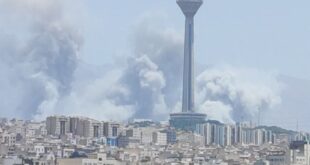سازمان عفو بینالملل از جمهوری اسلامی خواست با لغو قوانین حجاب اجباری، به مجازات زنان و دختران ایرانی برای سرپیچی از این قوانین پایان دهد.
عفو بینالملل در نامهای سرگشاده خطاب به مقامات جمهوری اسلامی که روز چهارشنبه ۱۹ اردپیبهشت منتشر شد، همچنین درخواست کرده است همه کسانی که به دلیل سرپیچی از رعایت حجاب اجباری بازداشت به سر میبرند «بی قید و شرط» آزادی شوند.
این سازمان از مقامات جمهوری اسلامی خواسته است نیروهای حکومتی را که مسئولیت اعمال قوانین حجاب اجباری به آنها محول شده است، منحل کند و افراد دخیل در نقض حقوق زنان از طریق اعمال این قوانین و مقررات را مورد بازخواست قرار دهند.
این نهاد حقوق بشری با اشاره به اجرای کارزار سراسری موسوم به «طرح نور» که مدافعان حقوق بشر و کاربران شبکههای اجتماعی از آن به عنوان «جنگ علیه زنان» یاد میکنند گفته است که اعمال خشونت علیه زنان به دلیل عدم رعایت قوانین حجاب اجباری در هفتههای اخیر تشدید شده است و مزاحمت مأمورانی که زنان و دختران را مورد آزار و اذیت فیزیکی قرار میدهند و یا آنها را با خشونت گرفته و به داخل خودروهای پلیس میاندازند، به «آدمربایی» تشبیه کرده است.
عفو بینالملل افزوده است که زنان همچنین گزارش دادهاند که مأموران جمهوری اسلامی هنگام بازداشت از دستگاههای شوک الکتریکی استفاده میکنند و آنها با محاکمههای ناعادلانه، توقیف خودرو و جریمههای نقدی روبرو میشوند.
این سازمان به مناسبت روز جهانی زن در هشتم ماه مارس نیز گزارشی منتشر کرد و با استناد به شهادتهای ۴۶ نفر و بررسی اسناد رسمی از جمله احکام دادگاهها و قرارهای دادستانی از آزار و تعقیب زنان و کودکان دختر به دلیل استفاده آنها از حقوقشان برای خودمختاری بدنی و آزادی بیان و عقیده توسط شمار زیادی از ارگانهای حکومتی خبر داد.
این سازمان گزیدهایی از شهادتهای ۲۰ نفر را منتشر کرد تا گوشهای از آنچه زنان و کودکان دختر در ایران به صورت روزانه با آن مواجه میشوند را تصویر کند. متن فارسی برگرفته از رادیو آمریکا . متن انگلیسی ضمیمه است
Iran: Women and Girls Facing Violent Crackdown
First UA: 39/24 Index: MDE 13/8029/2024 Iran Date: 7 May 2024
URGENT ACTION
WOMEN AND GIRLS FACING VIOLENT CRACKDOWN
Iranian authorities are waging a “War on Women” to punish defiance of forced veiling
in the wake of the “Woman Life Freedom” uprising. Since April, security forces have
intensified their enforcement of compulsory veiling in public spaces through
subjecting women and girls to constant surveillance, beatings, sexual violence,
electric shocks, arbitrary arrest and detention and other harassment.
TAKE ACTION: WRITE AN APPEAL IN YOUR OWN WORDS OR USE THIS MODEL LETTER
Ebrahim Raisi, President of the Islamic Republic of Iran and head of Supreme Council of National Security
c/o Embassy of Iran to the European Union, Avenue Franklin Roosevelt No. 15, 1050 Bruxelles, Belgium
Dear Mr Gholamhossein Mohseni Ejei,
Women and girls in Iran are facing a renewed assault on their human rights, dubbed the “War on Women”
by Iranian human rights defenders and social media users. Since mid-April 2024, when the authorities
announced the implementation of a new nationwide campaign called the “Noor (light) Plan”, security
forces across the country have intensified their violent enforcement of compulsory veiling. In recent weeks,
there has been a visible increase of security patrols on foot, motorbike, car and police vans in public
spaces enforcing compulsory veiling through surveillance of women’s hair, bodies and attire. Disturbing
videos have emerged on social media showing security forces physically assaulting women and girls in
public and arresting and detaining women and girls by violently throwing them into police vans in a manner
resembling abductions. The videos show the distressed women and girls screaming while being attacked
and dragged away by security forces. Women have also reported security forces using electric shock devices
during arrest and being subjected to unjust prosecutions, car confiscations and fines.
The crackdown intensified after Iran’s Supreme Leader, Ali Khamenei, issued a statement on 3 April 2024,
stating that compulsory veiling is a “religiously mandated decree and obligatory for women” and that its
non-compliance is being driven by “foreign interference” and should be addressed. On 13 April 2024, the
Commander of Tehran’s police force, Abbas Ali Mohammadian, announced that “From today, the police in
Tehran and other provinces will [confront] individuals who promote social abnormalities like appearing
without a headscarf. People who ignored previous police warnings will be specifically warned…and legal
action will be taken against them.” On 21 April 2024, the Commander of the Revolutionary Guards in
Tehran, Hassan Hassanzadeh, announced the formation of trained groups to enforce compulsory veiling in
public spaces called “Ambassadors of Kindness”, without specifying their exact composition and
institutional affiliation. On 23 April 2024, the Commander-in-Chief of Iran’s police force, the Law
Enforcement Command of the Islamic Republic of Iran (FARAJA), Ahmadreza Radan, announced that the
“irreversible Noor Plan” was being implemented with the approval of the parliament, judiciary and
government. On the same day, FARAJA issued a statement equating defiance of compulsory veiling with
“organized criminal gangs…involved in corruption, prostitution, pornography.” A “Bill to Support the
Culture of Chastity and Hijab” is nearing adoption in Iran’s parliament. If passed into law, it will codify the
Iranian authorities’ assault on women and girls for defying compulsory veiling.
I call on the Iranian authorities to stop punishing women and girls for exercising their rights to bodily
autonomy and freedom of expression, religion and belief; to immediately repeal all compulsory veiling laws
and regulations; and to disband all security forces tasked with enforcing compulsory veiling. I urge you to
unconditionally release anyone in detention for defying compulsory veiling and ensure that any officials
involved in violating women’s rights through implementation of compulsory veiling are held to account.
Yours sincerely,
First UA: 39/24 Index: MDE 13/8029/2024 Iran Date: 7 May 2024
ADDITIONAL INFORMATION
Since the announcement of the “Noor Plan”, women and girls have been documenting their ordeals and sharing
them on social media. On 13 April 2024, one woman stated in her tearful video testimony: “[The agents] wanted to
arrest me. The police agent came towards me and I told him not to touch me. There was a van there [to take me
away]. There were several female agents and one of them kept trying to forcibly pull my arm and bag. I was
screaming for her to let me go and was stressed that they would confiscate my mobile. I fell in the middle of the
street and all the drivers in the cars started tooting their horns in support [of me]. The female agents filmed me and
were laughing at me. They eventually let me go, but I don’t know what will happen now. I can’t even tell you to look
after yourselves because how can you do that unless we are [forced] to wear the hijab.” On 14 April, another
woman, Atefeh Mahmoudi, posted on X (formerly Twitter): “Today, the morality police detained me. A white
unmarked van (with two female agents and one [conscripted] soldier who was the driver), three motorcycles (each
with two male agents), and a car with two male agents suddenly surrounded me. Meaning 10 members of the
security forces lined up for me (excluding the van driver) as if they wanted to arrest a dangerous criminal. They
spoke to [me] using harsh language. In response to my protest asking where they were taking me and questioning
their treatment, one of them replied [using insulting language in Persian] ‘It is none of your business’. When I told
another agent that no [hijab and chastity] law had been officially passed, he started shouting. He threatened me
and said, ‘I will detain you until you learn not to talk back.’ They released me after I signed a written pledge.” A
student, Dina Ghalibaf, wrote about her ordeal on X on 15 April 2024: “Yesterday, in the police room of
Sadeghiyeh metro station, I insisted that as long as I am paying taxes, I have the right to use the metro. They
[security forces] violently dragged me into a room and gave me electric shocks. They handcuffed me the whole
time and one of the agents sexually assaulted me.” The next day, 16 April, Dina Ghalibaf was arrested, and she
was released on bail two weeks later, on 30 April 2024. A fourth woman whose ordeal was shared with BBC
Persian on 19 April 2024 stated: “I saw two agents on motorbikes. A van and a car also came towards me; five-six
female agents descended from the vehicles and dragged me on the ground. I was screaming. I heard a noise from
behind me and felt pain in my back and side. I fell to the ground and they put me into a van while filming and
photographing me for the prosecutors…There were five other women and girls in the van…In the police station,
there were about 30 of us, including a schoolgirl. They took me before a prosecutor who questioned me. I was in
pain [from the beating] and a doctor told me that my kidney had been ruptured.”
Eyewitnesses to the violence against women and girls also shared their accounts on social media. A man wrote on
X on 13 April 2024: “They brutally arrested a girl who was, at most, 17-years-old…She was clinging to the railings,
crying. A female officer punched down on her hand with a fist and a male officer pried the girl’s hands open and
dragged her by the hair to the van. It was as if they had captured a member of the Islamic State [armed group].”
Ahmadreza Radan and Hassan Hassanzadeh, who announced the latest draconian measures against women and
girls, are on lists of sanctions imposed on Iranian officials by the governments of Australia, Canada, UK and USA
as well as the EU for their involvement in serious human rights violations in connection with nationwide protests in
2009 and 2022.
In September 2023, UN human rights experts expressed concern about the “Bill to Support the Culture of Chastity
and Hijab”, stating that “the draft law could be described as a form of gender apartheid, as authorities appear to be
governing through systemic discrimination with the intention of suppressing women and girls into total
submission”. In March 2024, the UN Fact-Finding Mission on Iran published its report in which it concluded that
“punishments imposed on the basis of the mandatory hijab laws and policies against women and girls, such as
arrests, detention, fines, seizure of immovable property, travel bans, prohibition to use social media and the undue
restriction and denial of fundamental rights, including suspension from university, termination of employment, ban
on entry into public spaces, including government offices as well as parks, cinemas, public transport, are arbitrary
in nature and as such not permissible under international human rights law. Through the enforcement of these
laws and policies, the State violates women’s rights to equality, non-discrimination, to liberty and security of
person and to be free from torture or to cruel, inhuman or degrading treatment, freedom of expression, freedom of
movement, freedom of religion as well as the right to public life, to bodily integrity and autonomy, right to privacy,
and to access to education, health care and work, cumulatively amounting a severe deprivation of women and
girls’ fundamental rights, amounting to persecution.”
In March 2024, Amnesty International published new research on the intensifying persecution of women and girls
based on testimonies obtained from 46 individuals, which provide a glimpse into the frightening daily reality faced
by women and girls in Iran. See: https://www.amnesty.org/en/documents/mde13/7770/2024/en/.
PREFERRED LANGUAGE TO ADDRESS TARGET: Persian and English.
You can also write in your own language.
PLEASE TAKE ACTION AS SOON AS POSSIBLE UNTIL: 2 July 2024.
Please check with the Amnesty office in your country if you wish to send appeals after the deadline
 روزنه rowzane خبری – تحلیلی
روزنه rowzane خبری – تحلیلی




